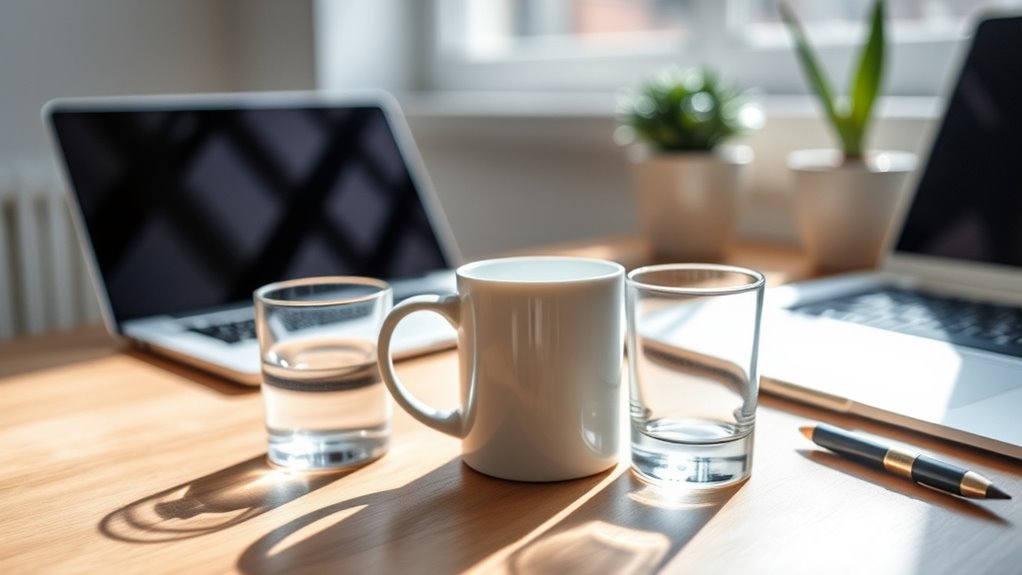Reducing caffeine can boost your productivity by helping you develop more stable energy levels and better sleep. When you rely less on stimulants, your body accesses natural energy reserves, reducing mood swings and crashes. Over time, this leads to a steadier focus and reliable energy throughout the day. Gradually cutting back and supporting your body with hydration, good nutrition, and rest makes shifts smoother. Keep exploring to learn how to make these changes effectively.
Key Takeaways
- Reducing caffeine prevents dependency and crashes, leading to more stable energy levels throughout the day.
- Gradual cutback minimizes withdrawal symptoms like headaches and fatigue, easing the transition.
- Lower caffeine intake enhances sleep quality, boosting overall productivity and focus.
- Decreasing reliance on stimulants allows the body to access natural energy reserves sustainably.
- Long-term, less caffeine results in improved mood, steadier energy, and reduced dependency for better daily performance.

If you find yourself relying heavily on caffeine to get through the day, it might be time to cut back. While caffeine can temporarily boost your alertness and focus, overdoing it often leads to crashes, dependency, and a cycle that’s hard to break. The good news is, reducing your intake can actually improve your overall productivity and well-being. When you cut down, you give your body a chance to tap into its natural energy reserves, which are more sustainable and less prone to fluctuations. Relying less on caffeine helps you develop better sleep patterns, sharper focus, and a steadier mood, all of which contribute to increased efficiency throughout your day. Incorporating cultural and regional breakfast habits can also support your energy levels and overall health by providing balanced nutrition to start your day. Additionally, embracing mindfulness practices can help manage cravings and improve your overall mental resilience during the transition.
However, stepping away from caffeine isn’t always easy. One of the biggest hurdles is dealing with withdrawal symptoms, which can include headaches, fatigue, irritability, and difficulty concentrating. These symptoms are temporary but can feel disruptive, especially if you’re used to consuming large amounts daily. To minimize discomfort, it’s best to reduce your intake gradually rather than quitting cold turkey. Slowly cutting back over a week or two allows your body to adjust without causing severe withdrawal symptoms. During this process, focus on boosting your natural energy through hydration, balanced meals, regular exercise, and adequate sleep. These habits support your body’s ability to produce and maintain energy without relying on stimulants.
As you decrease your caffeine consumption, notice how your body begins to recalibrate. You might initially feel sluggish or tired, but these feelings tend to fade as your system adapts. Over time, you’ll find that your energy levels become more stable, and your mood improves. This consistency can markedly enhance your productivity, since you’re not riding the highs and lows associated with caffeine spikes. Instead, you develop a more dependable energy baseline, helping you stay focused and motivated throughout your day. Remember, the goal isn’t to eliminate caffeine entirely but to find a healthier balance that supports your natural energy cycles.
Frequently Asked Questions
How Quickly Can I Expect to See Productivity Improvements?
Your timing expectations for productivity improvements vary with daily fluctuations and individual responses. Typically, you might notice changes within a few days to a week after reducing caffeine intake, but it can take longer depending on your habits and sensitivity. Be mindful of daily variations, as some days may feel better or worse. Stay consistent, and you’ll likely see gradual gains as your body adjusts, enhancing your overall productivity over time.
Are Decaffeinated Drinks Equally Effective?
Imagine switching from a roaring engine to a smooth, steady ride. Decaffeinated drinks still offer some decaffeinated effectiveness, but they don’t pack the same punch as regular coffee. If you’re looking for alternative stimulants, options like herbal teas or adaptogens can boost focus without the jitters. While decaf can support hydration and relaxation, it’s not a replacement for the energizing power of caffeine when you need a productivity lift.
Will Reducing Caffeine Cause Withdrawal Symptoms?
Reducing caffeine intake can cause withdrawal symptoms, especially if you’ve developed dependency symptoms. You might experience headaches, fatigue, irritability, or difficulty concentrating as your body adjusts. These caffeine withdrawal symptoms usually peak within a few days and gradually fade. To minimize discomfort, consider gradually lowering your caffeine consumption rather than stopping abruptly. This approach helps your body adapt smoothly and reduces the intensity of withdrawal symptoms.
Can I Replace Caffeine With Other Stimulants?
You can replace caffeine with natural alternatives like herbal supplements, which provide a gentle energy boost without the jitters or crashes. Options like ginseng, rhodiola, or matcha can enhance focus and alertness safely. Instead of relying solely on caffeine, try incorporating these natural stimulants into your routine for sustained productivity, reducing dependence on caffeine and minimizing withdrawal symptoms. Always consult a healthcare professional before starting new herbal supplements.
Is Moderate Caffeine Intake Still Beneficial?
Moderate caffeine consumption can still offer health benefits, like improved focus and alertness. If you keep your intake within recommended limits, you may experience better productivity without risking side effects like jitters or sleep issues. Just be mindful of how much you consume daily, and remember that moderation is key. Balancing your caffeine intake allows you to enjoy its benefits while maintaining overall health and well-being.
Conclusion
So, by trimming your caffeine intake, you’re pruning away the noisy weeds that block your garden of focus. Imagine your mind as a clear blue sky—less clouded by jitters and crashes. When you sip less, you let your natural sunlight shine through, illuminating your true potential. Sometimes, less really does mean more—more calm, more clarity, more productive days. Embrace the gentle balance, and watch your energy bloom like a well-tended flower.









